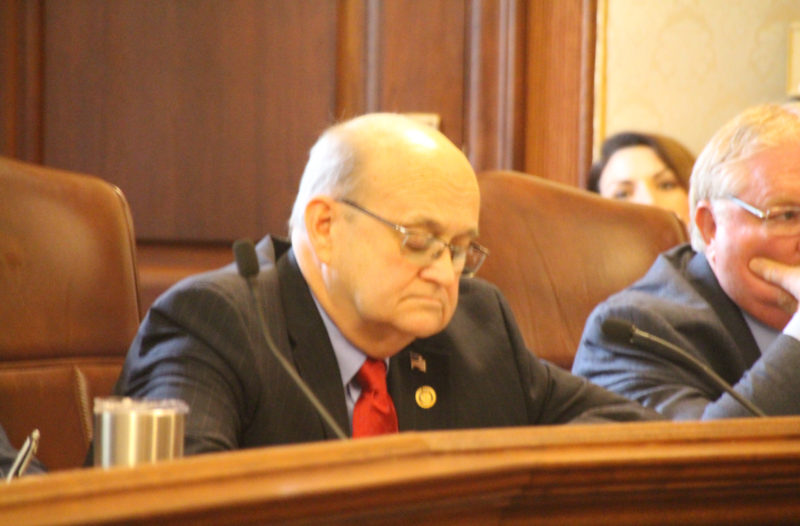Rehder’s right-to-work bill moves out of House committee
JEFFERSON CITY, Mo. – After a House Committee heard Rep. Holly Rehder’s right-to-work bill Tuesday afternoon, it was the Senate’s turn to debate labor reform Wednesday.
Sen. Dan Brown presented two bills to the Senate General Laws Committee: a right-to-work bill and a bill establishing “paycheck protection” for state employees. Brown said SB 19, his right-to-work bill, would give employees a chance to work in labor shops without being forced to pay labor dues.
“The goal of the union elite is simple: to control workers,” Brown said. “Employees should represent themselves with their employer if they so choose.”
Beyond one or two select exchanges, testimony and discussions between lawmakers and stakeholders was much more muted than the previous day’s House proceedings, even though many who testified Wednesday also testified before the House Committee yesterday.
For the opposition, the hearing appeared to be a case of going through the motions. Senate Minority Floor Leader Gina Walsh, Sen. John Rizzo and Sen. Jake Hummel – all major labor voices in the General Assembly – asked only two questions between them, and many of the labor testifiers spoke knowing the debate had effectively been decided, given the Republican supermajorities in both chambers and Republican Gov. Eric Greitens with his pen at the ready.
Walsh offered a statement during the hearing contending a right-to-work bill would not bring the economic growth its supporters have promised. She cited numbers released by former Gov. Jay Nixon that Missouri’s net gain of over 57,000 jobs beat out all other surrounding states, most of which are right-to-work.
“States around us with right-to-work laws created fewer jobs last year than Missouri, so why on earth would we follow their lead to lower wages and fewer jobs?” she said. “Right-to-work is nothing more than a political ploy meant to divide Missourians against each other and distract legislators from their responsibility to balance the budget and fund Missouri schools.”
Brian Bunten, general counsel for the Missouri Chamber of Commerce, countered in his testimony Missouri was currently only operating at 60 percent of its manufacturing capacity in part because site selectors for industries and businesses did not desire to come to non-right-to-work states.
“Sometimes it’s the number one issue,” Bunten said. “If we’re not right-to-work, we’re not even considered. We are getting crossed off of those lists. With 27 states now, the trend is going towards right-to-work, and I don’t think we want to be left behind.”
Brown’s noted his paycheck protection bill was “not quite as onerous” as the bill he filed on the subject last year. SB 21 would change current statute allow unions to withhold fees from public employee paychecks for political purposes only if a public employee opted into it each year. The current system is more of an opt-out. However, the language in this year’s version of the bill is nearly identical to last year’s.
Michael Hafner of the Missouri Century Foundation stated his organization, a free market group, supported Brown’s bill.
“We believe SB 21 is an important pro-worker initiative,” Hafner said. “Workers, not unions should decide if they want to contribute to the union’s political activity.”
Bradley Harmon, president of the children’s division of the CWA 6355 in Kansas City, argued the bill was redundant because public employees have already authorize unions to withhold dues directly from paychecks. He instead criticized the Senate for attempting to pass this bill while knowing Missouri has some of the lowest-paid public employees in the state.
“To us as public employees, this bill looks like you are trying to shield yourself from accountability,” he said. “His bill looks like you are trying to put barriers in the way of public employees to organize around the fact that you refuse to pay a children’s service worker… more money than someone who works at QuikTrip.”
Both bills are expected to pass out of committee.
House right-to-work update
The majority party combined HBs 91, 42, 131, 265 and 314, primarily authored by Rep. Holly Rehder, and passed it out of committee on an 8-4 vote along party lines.
Rep. Doug Beck, D-St. Louis, attempted to add a referendum clause to the bill, but Republicans rejected those efforts.
“It is my sincere belief that a bill of this magnitude should be decided by a vote of the people, not by a small assembly with a predisposition for the issue,” Beck said. “And, as we heard in witness testimony yesterday, a large faction of Missouri citizens agree.”















